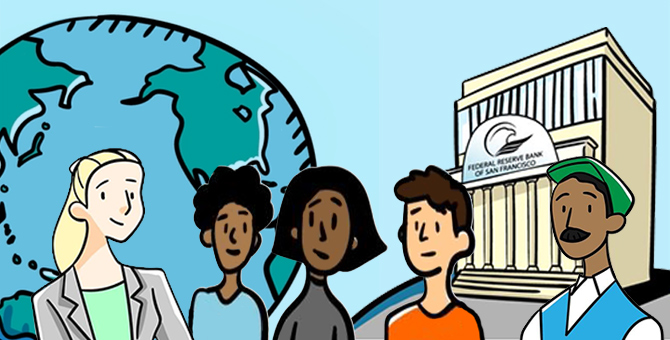American environmentalist John Muir once said, “When we try to pick out
anything by itself, we find it hitched to everything else in the Universe.”
Our connections to one another — to neighbors both near and far, and our
dependence on natural resources has become more clear than ever before.
As we recognize Earth Day’s 50th anniversary at the San Francisco Fed, we’re
reminded of how interconnected and interdependent we are across the planet.
This year, Earth Day occurs during a large global crisis. With the recent
shelter-in-place actions implemented across much of the world, the ripple
effects seem never-ending. Our world and how we live in it has changed
dramatically in what feels like overnight.
From an environmental perspective, being homebound has had some beneficial
outcomes. Because fewer people are commuting, we’ve seen reduced air pollution
and carbon emissions. In the Bay Area, for example, air pollution is down 21%
in Oakland, 36% in San Jose, and 41% in San Francisco. According to the EPA, one
car trip — assuming it’s a passenger vehicle with 22 mpg — equates to 20
pounds of carbon (source:
Environmental Protection Agency). Taking into account the millions of people across the world who are also
sheltering in place, the air we share has become both cleaner and cooler for
everyone in a matter of weeks.
Improved air quality is just one example that shows how simple, individual
actions can add up to a positive outcome that we can all benefit from. At the
SF Fed, this understanding of our reliance on each other as caretakers of
people and resources is at the heart of Earth Day. We’ve also increasingly
recognized the importance of the environment and climate to our mission. Watch
our quick video that explains.
Watch: Why Does the SF Fed Care About Climate Change?
Transcript
Why does the San Francisco Fed care about climate change?
Because it can affect our goal to promote a strong economy with low
inflation and financial stability.
We need to understand and prepare for the increase in severe weather
events, and for the disruptions that they may cause.
We regulate and supervise banks, so we need to make sure they are
prepared for financial risks related to climate change.
We set policy that helps keep people employed and prices stable. So we
need to understand current and future risks to our economy.
We provide enough currency to meet public demand, so we make sure you
have access to cash when you need it.
When you put all these pieces together, it becomes pretty clear. Climate
change is an economic issue that we can’t afford to ignore.
Learn more about why the San Francisco Fed cares about climate change:
SFFed.us/climate
Robin Connell is Senior Manager, Social Responsibility at the Federal Reserve
Bank of San Francisco. She holds an MBA in Sustainable Management from
Presidio Graduate School.
You may also be interested in:
The views expressed here do not necessarily reflect the views of the management of the Federal Reserve Bank of San Francisco or of the Board of Governors of the Federal Reserve System.
